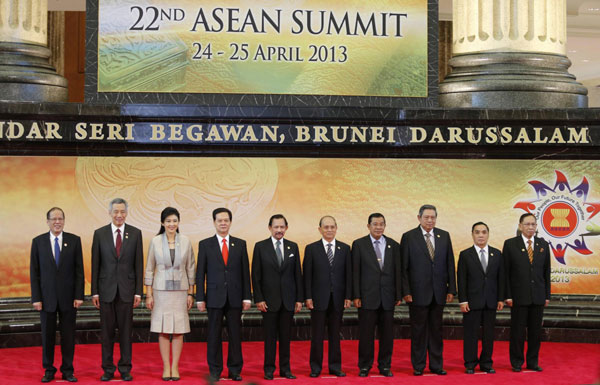ASEAN leaders satisfied with progress of AEC
Updated: 2013-04-25 17:54
(Xinhua)
|
|||||||||||
 |
|
Leaders of the Association of Southeast Asian Nations (ASEAN) pose for a group photo during the 22nd ASEAN Summit in Bandar Seri Begawan April 25, 2013. The leaders are (L-R) Philippine President Benigno Aquino, Singapore's Prime Minister Lee Hsien Loong, Thailand's Prime Minister Yingluck Shinawatra, Vietnam's Prime Minister Nguyen Tan Dung, Brunei's Sultan Hassanal Bolkiah, Myanmar's President Thein Sein, Cambodia's Prime Minister Hun Sen, Indonesia's President Susilo Bambang Yudhoyono, Laos Prime Minister Thongsing Thammavong and Malaysia's Senate President Abu Zahar Ujang.[Photo/Agencies] |
BANDAR SERI BEGAWAN - The ASEAN leaders took note of and expressed satisfaction at the progress towards setting up an ASEAN Economic Community (AEC) by the end of 2015, according to the Chairman's statement of the 22nd ASEAN Summit Thursday.
The two-day summit under the theme "Our People, Our Future Together" opened at the Prime Minister's Office here Wednesday, where leaders of the 10 member states gathered to review and deliberate on the economic integration efforts, and a host of regional and international issues of common concern.
According to the statement, 259 measures, or 77.54 percent of the AEC Blueprint, have been implemented as of now.
The leaders agreed to enhance ASEAN's competitiveness by better facilitating trade and investment, leveraging upon on-going work to establish the AEC. They also recommended rolling out a roadmap to set out initiatives to ease the way of doing business and address investment impediments in the region.
Official statistics show that since the adoption of the Blueprint in November 2007, per capita income in the region has risen from $2,267 to $3,759 dollars in 2012.
The total trade of the 10-nation bloc grew by 16.8 percent, from $2.05 trillion in 2010 to $2.4 trillion in 2011, as intra-ASEAN trade reached $598 billion from $520 billion, an increase of 15.1 percent year-on-year.
The ASEAN region has also continued to attract foreign investors, generating a record foreign direct investment inflow of $114 billion in 2011, a 23 percent rise from 2010.
Established in 1967, ASEAN groups Brunei, Cambodia, Indonesia, Laos, Malaysia, Myanmar, the Philippines, Singapore, Thailand and Vietnam.
Related Stories
Taiwan to seek ASEAN market through Guangxi 2013-04-24 20:14
Hong Kong to work closer with ASEAN in tourism 2013-04-24 17:18
HK entrepreneur tells how to do business in ASEAN countries 2013-04-24 17:38
Brunei sees ASEAN, China grow side by side 2013-04-24 14:30
Economic issues to dominate ASEAN summit 2013-04-22 17:22
ASEAN-China environmental ties enhanced 2013-04-18 17:16
Today's Top News
Factories to face headwinds from enlarged TPP
Investors find a home in overseas real estate
More Chinese travel overseas, study reveals
Student in UK jailed for attempting bribe
Premier Li in plea to
quake rescuers
Xi meets former US heavyweights
China still top spot for Japanese companies
Nation sets sights on bigger carrier
Hot Topics
Lunar probe , China growth forecasts, Emission rules get tougher, China seen through 'colored lens', International board,
Editor's Picks

|

|

|

|

|

|





